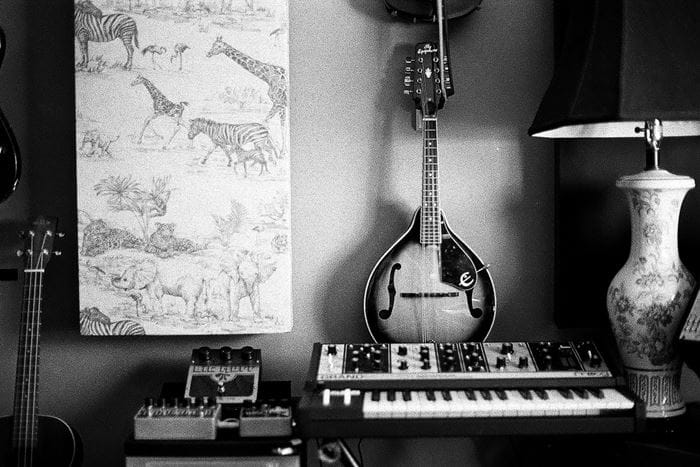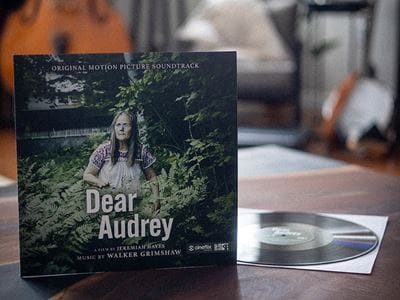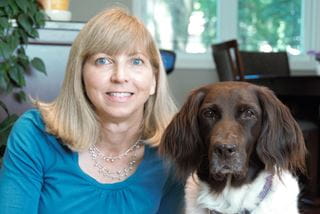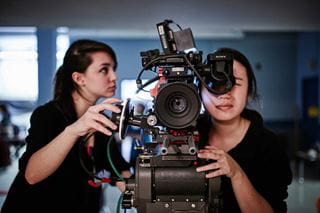
CSA nominee Nick Grimshaw found career success through networks built in class
 by Vitusha Oberoi – Apr 25, 2023
by Vitusha Oberoi – Apr 25, 2023  There’s more to a Sheridan program than the curriculum taught in class — and Nick Walker Grimshaw (Media Arts ’14, Bachelor of Film & Television ’18) discovered that quite early as a student of Media Arts. Although he was studying filmmaking, he always had a passion for music. Soon after joining Sheridan, he realized many of his fellow students needed music for their class projects, and he started volunteering his skills.
There’s more to a Sheridan program than the curriculum taught in class — and Nick Walker Grimshaw (Media Arts ’14, Bachelor of Film & Television ’18) discovered that quite early as a student of Media Arts. Although he was studying filmmaking, he always had a passion for music. Soon after joining Sheridan, he realized many of his fellow students needed music for their class projects, and he started volunteering his skills.
Little did he know then that by sharing his talent with the budding filmmakers in Sheridan’s classrooms, he was creating an invaluable network and setting the stage for a successful career in the film industry as a music composer. Many of the college mates he worked with went on to establish themselves and started sending work his way, helping Grimshaw start his journey composing music for film and television.
In a chat with Sheridan, Grimshaw, who was nominated for a Canadian Screen Award for best original music in a feature-length documentary this year, says the connections he made at Sheridan, and the college’s reputation for excellence, have gone a long way toward his success in the industry.

Q. Yours is an amazing story because you studied film at Sheridan but took up music as a career. How did this shift come about?
A. I originally wanted to be a filmmaker and joined Media Arts at Sheridan, but I had always been interested in music. Throughout those years at college, a lot of students needed music for their class projects, and I took that as an opportunity to volunteer and compose music for them. Many of my classmates have gone on to become successful filmmakers and producers, and I’m very lucky to have continued writing music for many of them and kick-start my career from there.
“Even though a lot of these composers are so much better at writing music than I am, the fact that I got to mingle in Media Arts with up-and-coming filmmakers really paid off.”
It was quite a non-traditional approach to pursuing music as a career, but when I speak to other composers who went to school to study music, it’s clear that a big challenge they all struggle with is meeting filmmakers. And even though a lot of these composers are so much better at writing music than I am, the fact that I got to mingle in Media Arts with up-and-coming filmmakers really paid off.
Many Sheridan graduates have established themselves as the hardest-working and most professional people in the industry. Beyond working with them, they are all kind enough to recommend me when someone else they know is looking for a composer. Almost every single project I've worked on has been through word-of-mouth from a Sheridan grad.
Q. Can you tell us a little about your music projects at Sheridan and after graduating?
 A. Two of my favourite film projects at Sheridan were the musicals I worked on. They were a great collaboration between both Media Arts and the Music Theatre departments. One of these projects, A Bard’s Tale, even had an animated segment where we worked closely with the Animation department as well. The music was composed before filming, there were rehearsals leading up to the shoot dates, and we spent a lot of time in the Sheridan recording studios during post-production.
A. Two of my favourite film projects at Sheridan were the musicals I worked on. They were a great collaboration between both Media Arts and the Music Theatre departments. One of these projects, A Bard’s Tale, even had an animated segment where we worked closely with the Animation department as well. The music was composed before filming, there were rehearsals leading up to the shoot dates, and we spent a lot of time in the Sheridan recording studios during post-production.
After graduation, one of my first professional gigs was for McDonald’s Happy Meal. The gig was actually brought to me by my old roommate, someone I never expected to be directing kids in Happy Meal commercials. He and I did those spots for about three years. The crew was full of Sheridan grads, including my partner, Jade Chittock, whom I met in Media Arts and who is now an assistant director and producer. We would film once every two months or so, and it was always like a Sheridan reunion for everyone.
Q. From producing music for classmates to getting nominated for CSA best original music in a feature-length documentary for Dear Audrey – how did your music capture the film’s emotional journey into the world of people living with Alzheimer’s?
A. First of all, it was great to see how many Sheridan graduates were nominated for CSAs, but also just how many of them were fellow classmates from my year. It felt good to be part of that group.
 Working on Dear Audrey was a case study of restraint and subtlety for me. The movie covered a serious subject matter, and as a composer, I didn't need to push the emotion any further. If my music was in any way melodramatic, it would’ve taken away from the film. The director, Jeremiah Hayes, helped me hone in on how to hold back but still get the message across, and how to treat the audience with respect instead of telling them how to feel. We didn't want to cheapen the events by doing anything clichéd. The film follows a true story of hope and hardship, and that was enough to make people really resonate with it.
Working on Dear Audrey was a case study of restraint and subtlety for me. The movie covered a serious subject matter, and as a composer, I didn't need to push the emotion any further. If my music was in any way melodramatic, it would’ve taken away from the film. The director, Jeremiah Hayes, helped me hone in on how to hold back but still get the message across, and how to treat the audience with respect instead of telling them how to feel. We didn't want to cheapen the events by doing anything clichéd. The film follows a true story of hope and hardship, and that was enough to make people really resonate with it.
Q. What are some of the projects you are working on currently?
A. The latest projects I’ve been working on since Dear Audrey deal with similarly deep topics like mental health, disabilities, and suicide. Working on Dear Audrey has really gone a long way in how I approach these new projects. All the filmmakers I'm working with appreciate that I'm not there to steal the spotlight or to make my music unnecessarily conspicuous. I'm there to accompany what already exists, to respect it — not cheapen it — to not take away from the seriousness and the story that's already there.
“So much of the business is about making connections with other people. You need to be a good person to be around, and you need to have interests outside of your craft.”
Q. What has contributed to your success in the film industry?
A. Most musicians, and even filmmakers, can be very introverted people. Many of us like to keep to ourselves. But so much of the business is about making connections with other people. You need to be a good person to be around, and you need to have interests outside of your craft. It’s great that I was in Media Arts before I got into the world of music. I’ve got a wide variety of influences and interests, and I studied filmmaking and storytelling before switching over to music. I think it helps me bring more to a project than just being able to compose.
Q. What advice do you have for Sheridan’s students in the arts?
A. I don't want to sound cheesy – but just keep working hard and don’t get hung up on failures. You should embrace the failures because they are each their own learning opportunity. I wouldn't have established some of the best practices into my craft if it weren't for the failures that caused me to rethink things.
“I’ve got a wide variety of influences and interests, and I studied filmmaking and storytelling before switching over to music. I think it helps me bring more to a project than just being able to compose.”
This is an industry where you will fail a lot. We are all artists, but we have clients to serve, we have department heads to follow, we have collaborators to work with. We are hired to create our art, but our art might not match everyone’s exact vision at first, so you need to be ready to get rejected and be ready to take notes and start over again, to revise and keep on going.
The Dear Audrey soundtrack is up on all streaming platforms, and a limited-edition Vinyl LP is available for purchase at walkergrimshaw.com/dear-audrey
Banner photo: Nick ‘Walker’ Grimshaw (Media Arts ’14, Bachelor of Film & Television ’18), who was nominated for CSA best original music in a feature-length documentary for Dear Audrey, in his studio. (All photos supplied by Grimshaw.)
Media Contact
Meagan Kashty
Manager, Communications and Public Relations






